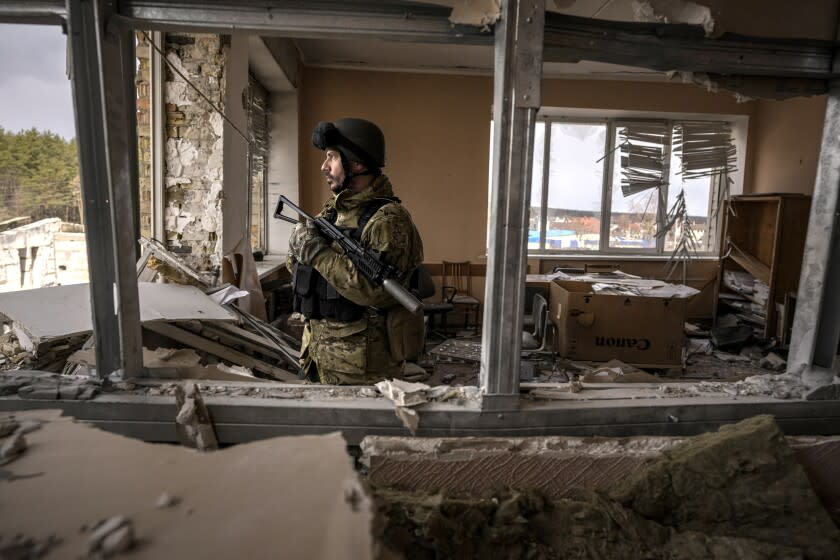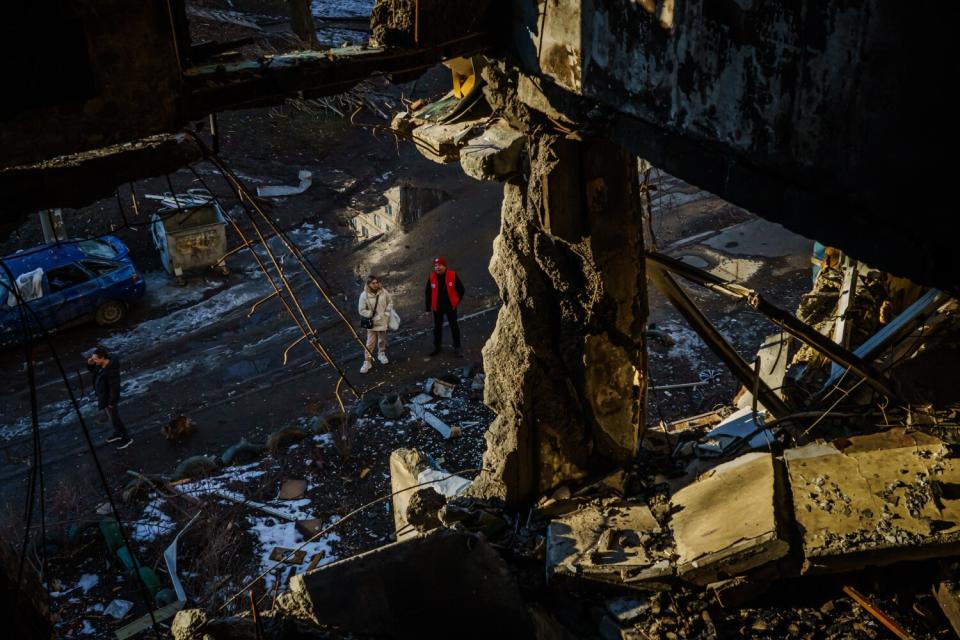Zelensky holds out possibility of Ukrainian 'neutrality' as Russian assaults continue

After signals that Russia’s military might scale back its assault on Ukraine’s capital, Moscow's forces on Monday kept up their shelling of Kyiv suburbs as negotiators gathered in Istanbul for a new round of talks.
Ukrainian President Volodymyr Zelensky said his country's forces had defeated Russian troops and recaptured Irpin, a town on the northwestern edge of Kyiv that has seen fierce street battles. But he warned that the struggle for the capital was not over.
“Our defenders are advancing in the Kyiv region, regaining control over Ukrainian territory,” Zelensky said Monday night. “Irpin was liberated. Well done! ... However, it is too early to talk about security in this part of our region.”
Russian troops continued to control the region north of Kyiv and had significant resources and manpower, Zelensky said, even if Ukraine’s forces had destroyed or forced them to abandon a large amount of equipment.
“The situation everywhere remains tense,” Zelensky said. “This is a ruthless war against our nation, against our people, against our children.”
Ukraine's deputy defense minister, Hanna Maliar, warned that Russia was still trying to build a corridor around Kyiv to block supply routes that bring in arms, ammunition and food.
“We must speak honestly: The enemy is not letting up attempts to seize Kyiv after all,” Maliar said on Ukrainian television. “Taking Kyiv essentially means taking Ukraine. So that is their goal."
As Russian and Ukrainian officials assembled in Turkey for a fresh round of negotiations set to begin Tuesday, Zelensky said his nation was ready to declare its neutrality, one of Russia’s core demands.
But even as Zelensky signaled he was willing to let go of aspirations to join the North Atlantic Treaty Organization — a key concession considering pursuit of membership is enshrined in the country’s constitution — he stressed that any deal must be voted on by Ukrainians in a national referendum held without Russian troops in Ukraine.
In a separate video address ahead of negotiations, to be held in person in Istanbul, Zelensky said his nation was seeking peace and "the restoration of normal life."
After four prior rounds of negotiations — the last one via video — the path to peace or even a cease-fire was unclear in a war that has killed more than 1,150 civilians, displaced millions of Ukrainians and made Russia an international pariah.
Ukrainian presidential advisor Mykhailo Podolyak, who has been part of negotiations and spoken optimistically about them, struck a more somber tone Monday.
"Again, total missile strikes at Ukraine. Lutsk, Kharkiv, Zhytomyr, Rivne. Every day, more and more rockets. Mariupol under carpet bombing," he tweeted. "Russia no longer has a language, humanism, civilization. Only rockets, bombs and attempts to wipe Ukraine off the face of the earth. Does Europe really like it?"
Kremlin spokesman Dmitry Peskov said that, from Moscow's point of view at least, "no significant progress" had been made in peace talks thus far. He said in-person talks would allow the two sides to move forward "in a more concentrated way."
President Biden, questioned at the White House about his comment over the weekend that Russian President Vladimir Putin "cannot remain in power," said he was speaking in a personal capacity, not articulating any official change in U.S. policy.
"I'm not walking anything back," he said. “I was expressing the moral outrage that I felt toward this man. I wasn't then, nor am I now, articulating a policy change."
In a news briefing, Peskov said that Biden’s statement “makes us worry” and that Russian officials would continue to closely monitor the U.S. president’s statements.
Biden, who criticized President Trump's careless rhetoric during the 2020 campaign and argued that the words of a president matter, bristled at the "ridiculous" suggestion that his own comment in Warsaw could be seen as a statement of policy given how careful his administration has been to avoid a direct confrontation with Putin.
"Nobody believes I was talking about taking down [Putin]," he said. "The last thing I want to do is engage in a land war, a nuclear war with Russia."

In the last week, U.S. and British intelligence have said that Russia has scaled back its forces on the outskirts of Kyiv in the face of fierce fighting from Ukrainian defenses.
“Russian forces have not only ceased to make any advances toward the city, but ... are making really no efforts on the ground to advance on the city,” a senior U.S. Defense official said Monday.
The British Ministry of Defense said in a daily report Monday that logistical shortages have been compounded by a continued lack of momentum and low morale among the Russian military.
Still, the Kyiv regional military administration said Monday that the western suburbs of Bucha, Irpin, Hostomel and Makariv had been pounded by constant attacks from Russian forces, with multiple shellings of housing estates and social infrastructure over the last 24 hours.
The mayor of Irpin said Monday that Ukrainians had defeated Russian troops. "Our Irpin has been liberated from Moscow’s evil!!!" Mayor Oleksandr Markushyn posted on Telegram. “Glory to Ukraine! Glory to her defenders!”
He also urged residents not to return, noting that the situation was still dangerous with shelling and mines.
"We understand that there will be more attacks on our town and we will defend it courageously," he said.
Analysts at the Washington-based Institute for the Study of War assessed in a report Monday that the Kremlin had not redeployed Russian combat power away from Kyiv to support operations in eastern Ukraine. At the same time, Russian conscription efforts, which Ukrainian intelligence expects to begin Friday, are unlikely to provide enough combat power to relaunch major offensive operations any time soon.
"Russia’s pool of available well-trained replacements remains low and new conscripts will require months to reach even a minimum standard of readiness," the report said.
In the south and east, British intelligence said Russia had gained ground as it continued its all-out assault and attempt to capture the strategic southern port of Mariupol. Conquering the city would help Russian forces establish a corridor across Ukraine's south to the Crimean peninsula, which Moscow annexed in 2014 but which has no land connection to Russia.
In an interview with independent Russian journalists Sunday, Zelensky singled out the city as the site of some of the most horrific consequences of Russia's invasion. Still under Ukrainian control, it has seen the majority of its 430,000 residents flee while those who remain struggle to find food and water in neighborhoods of rubble. How much longer the city can continue to hold out against relentless shelling and lack of humanitarian relief is increasingly open to question.
Mariupol is "littered with corpses — no one is removing them — Russian soldiers and Ukrainian citizens," Zelensky said in the interview. It was conducted in Russian with three journalists based outside Russia and one in Moscow.
He also held out the possibility of neutrality for Ukraine, a concession he has previously broached but addressed more emphatically this time.
“Security guarantees and neutrality, non-nuclear status of our state — we are ready to go for it. This is the most important point,” Zelensky said, adding that the neutrality move would require a national referendum. He said negotiators would refuse Russian demands for the demilitarization and "de-Nazification" of Ukraine, ideas Zelensky called "incomprehensible."
The Kremlin, which has banned media in Russia from describing its invasion as a "war," warned news outlets not to publish Zelensky's remarks.
Putin’s stranglehold of Russian news outlets tightened Monday as the nation's last major independent newspaper critical of the Kremlin’s invasion of Ukraine announced it was suspending publication after receiving a second warning from government censors.
The Novaya Gazeta, whose editor in chief, Dmitry Muratov, was awarded the 2021 Nobel Peace Prize for his “efforts to safeguard freedom of expression,” said that it would cease publishing in print and online until the end of the “special operation in Ukraine.”
Amid the ongoing stalemate, Ukrainian Deputy Prime Minister Iryna Vereshchuk said Monday that there would be no safe passage via negotiated humanitarian corridors for civilians seeking to flee battered cities.
Vereshchuk, who typically announces evacuation routes daily, blamed Russian "provocations" for the closing of safe corridors. Ukraine has accused Russia of blocking routes and abducting humanitarian volunteers, including members of the Red Cross.
In total, the war has created 3.8 million Ukrainian refugees and displaced millions more internally since Russia launched its invasion Feb. 24.
Russian forces have since been stuck outside Kyiv, without a single breakthrough in penetrating the heart of the capital. But they have kept up a steady assault by air, with more explosions reported on the city's outskirts Monday morning and air-raid sirens sounding in the afternoon. It was unknown if missiles hit targets or if they were intercepted by Ukrainian forces.
In a sign of the city's struggle to prevail, schools in Kyiv reopened Monday for online instruction but with what municipal official Valentyn Mondryivsky said was a new goal of providing kids with "psychological support” amid the war. Mondryivsky said homework was being limited in order to avoid putting additional stress upon students.
In the northeast, local officials said Ukraine had regained control of the towns of Trostyanets and Boromlya. The towns are about 35 miles south of the city of Sumy, which has been surrounded and shelled by Russian troops.
In hard-hit Kharkiv, Ukraine's second-largest city, Mayor Ihor Terekhov said Monday that 1,410 structures, the vast majority of them residential buildings, had been destroyed in the war.
Loud booms were heard overnight. Attacks appeared to target Kharkiv's outskirts.
Terekhov said one-third of Kharkiv's prewar population of 1.5 million had left. Many more remain huddled in subway stations that have become bomb shelters.
Most evacuees around the country make their way to western Ukraine, which has suffered less violence than the south and east. Many eventually land here in Lviv before crossing the western border into Poland.
The Lviv area has been largely free from Russian assault, despite near-daily air-raid alarms, frequent funerals for soldiers and military checkpoints on roads leading to and from the city.
But it hasn't been fully out of the crosshairs. Russian missiles have targeted western Ukraine four times since March 13, hitting military or fuel depots, including a strike on fuel tanks Saturday that was the closest attack to Lviv since the war began. Fires raged at the site for more than 14 hours before being extinguished. Authorities reported no fatalities and a handful of minor injuries.
On Monday, U.N. Secretary-General Antonio Guterres announced that the United Nations had asked Martin Griffiths, its undersecretary-general for humanitarian affairs and emergency relief coordinator, to immediately explore with Ukrainian and Russian authorities "possible agreements and arrangements for a humanitarian cease-fire."
“A cessation of hostilities will allow essential humanitarian aid to be delivered and enable civilians to move around safely,” Guterres said at a news conference outside the Security Council in New York. “It will save lives, prevent suffering and protect civilians.”
McDonnell reported from Lviv, Kaleem from London and Jarvie from Atlanta. Times staff writers Marcus Yam in Kharkiv and Eli Stokols in Washington contributed to this report.
This story originally appeared in Los Angeles Times.


